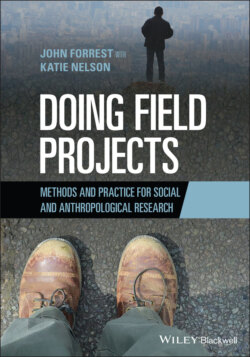Doing Field Projects

Реклама. ООО «ЛитРес», ИНН: 7719571260.
Оглавление
John Forrest. Doing Field Projects
Doing Field Projects: Methods and Practice for Social and Anthropological Research
Contents
List of Illustrations
List of Tables
Guide
Pages
Preface (Including a Word to Instructors)
Foreword (Including a Word to Student Readers)
1 Introduction. Part I A Brief History of Fieldwork. Why Fieldwork?
Armchair Anthropology
The Evolution Century
Off the Verandah and into the Colonies
Post-Colonial Anthropology
Part II Analytic Strategies. Fieldwork Vs Ethnography (or Ethnology)
Objective Vs Subjective (and Anti-Objective)
Idiographic Vs Nomothetic Approaches
Undergraduate Fieldwork
Vocabulary and Writing
Notes
2 Getting Started
Equipment. Smartphone
Notebook
Voice Recorder
Camera
Computing
Keeping a Journal
3 Ethics of Fieldwork
Do No Harm
Institutional Approval
Informed Consent
Openness
Anonymity/Confidentiality
4 Research Design
Formulating a Research Question
Identifying a Unit of Analysis
Presenting Your Data
Part 1. Setup
Part 2. Data
Part 3. Analysis and Conclusions
5 Self-Study
Learning Goals
Project #1: Seven-Day Sensory Diary
Instructions
Project #2: Personal Essay
Self-Study: Islay Hill
Autoethnography
Reflexivity
Two Types of Reflexivity
Further Reading
6 Proxemics
Learning Goals
Instructions
Further Reading
7 Mapping
Learning Goals
Instructions
Additional Suggestions
Further Reading
8 Recorded Interviews
Learning Goals
Ethnographic Interviewing
Instructions
Additional Options. Video Interviewing
Online Interviewing
Bilingual Interviews
Further Reading
9 Participant Observation
Learning Goals
Instructions
Further Reading
10 Engaged Anthropology
Learning Goals
Engaged Interviews
Instructions
Engaged Participant Observation
Choose the Event
Research Question
Data Gathering
Presentation
Additional Projects
Further Reading
11 Process Documentation
Learning Goals
Instructions
Further Reading
12 Visual Anthropology
Learning Goals
Instructions
Additional Possibilities
Further Reading
13 Sensory Observation
Learning Goals
Instructions
Sensing and Mapping
Further Reading
14 Performance
Learning Goals
Instructions
Additional Research Possibilities
Multiple Performances
Audience Reception
Performance Spaces
Further Reading
15 Life Histories (and Oral History)
Learning Goals
Instructions
Further Reading
16 Charting Kinship
Learning Goals
Instructions
Additional Suggestions
Further Reading
17 Digital Ethnography (1) Social Media
Learning Goals
Online Communities
Online Community Project Instructions
Selfie/Self-Instructions
Smartphone Bootcamp Instructions
Influencers
Influencer Instructions
Cancel Culture
Cancel Culture Instructions
#Activism
#Activism Instructions
Further Reading
18 Digital Ethnography (2) Online Gaming
Learning Goals
Instructions
Further Reading
19 Digital Ethnography (3) Human–Computer Interaction
Learning Goals
Instructions
Virtual Reality and Augmented Reality
Other Human–Computer Interactions
Further Reading
20 Digital Ethnography (4) Online Meetings/Classes
Learning Goals
Instructions
Further Reading
21 Winding Down and Gearing Up
What Can Anthropology Do?
Next Steps
Further Reading
Notes
References Cited
Index
WILEY END USER LICENSE AGREEMENT
Отрывок из книги
John Forrest with Katie Nelson
Undergraduate student needs are highly varied, but, no matter what their personal and professional goals in life are, they can all benefit from having some grounding in anthropological methods. While it is typical for a biology or chemistry course to have a lab component, it is less common for cultural anthropology courses to have a methods course. This is true for a number of reasons. First, anthropological fieldwork does not happen in a self-contained laboratory. Therefore, it is not easy to supervise. Second, fieldwork can take considerable amounts of time (with much of it unproductive). Third, there are numerous ethical concerns about dealing with human subjects that have to be monitored carefully. Fourth, setting up the kind of fieldwork projects that undergraduates can productively engage in is a challenge. The last issue is the reason for this book. Undergraduate fieldwork is similar to graduate work in some ways, but not identical by any means, and should really be handled differently. Hence the projects in this volume.
.....
We commonly call the methods of physical scientists, such as Galileo and Newton, “reductionist” because they take the complexity of observable reality and reduce all the details to simple principles that ultimately govern the seemingly endless details. The observer stands outside of what is being observed in order to uncover its mysteries. The philosopher Wilhelm Windelband (1848–1915) called this approach “nomothetic” and contrasted it with the “idiographic” approach of the humanities. The humanistic approach is the diametric opposite of reductionism because it is interested in exploring the rich contexts and diversity of cultural phenomena, rather than stripping them away in order to hypothesize simple, unifying principles.
For example, if you like romantic comedies, you will not be stopped from watching a new Netflix release by a friend telling you that the main characters in the movie fall in love near the beginning, face a difficulty that pulls them apart, but then find a way, by some twist of fate or other plot device, to be together in the end. You know this structure: you like it. You take this structure as a given, and you go to the movie because you want to see the specifics: the exact character of the principles, the jokes, the absurd misunderstandings, and so forth. It is the particulars that attract you, not the generalities (which you assume). We call the focus on the particulars of a situation, over the desire to reduce its specifics to general rules, an idiographic approach, and it is the hallmark of interpretive analysis in ethnography. This book takes the position that ethnographic analysis sits somewhere between the nomothetic and the idiographic. Through the projects in this book you will have ample opportunity to explore both approaches.
.....